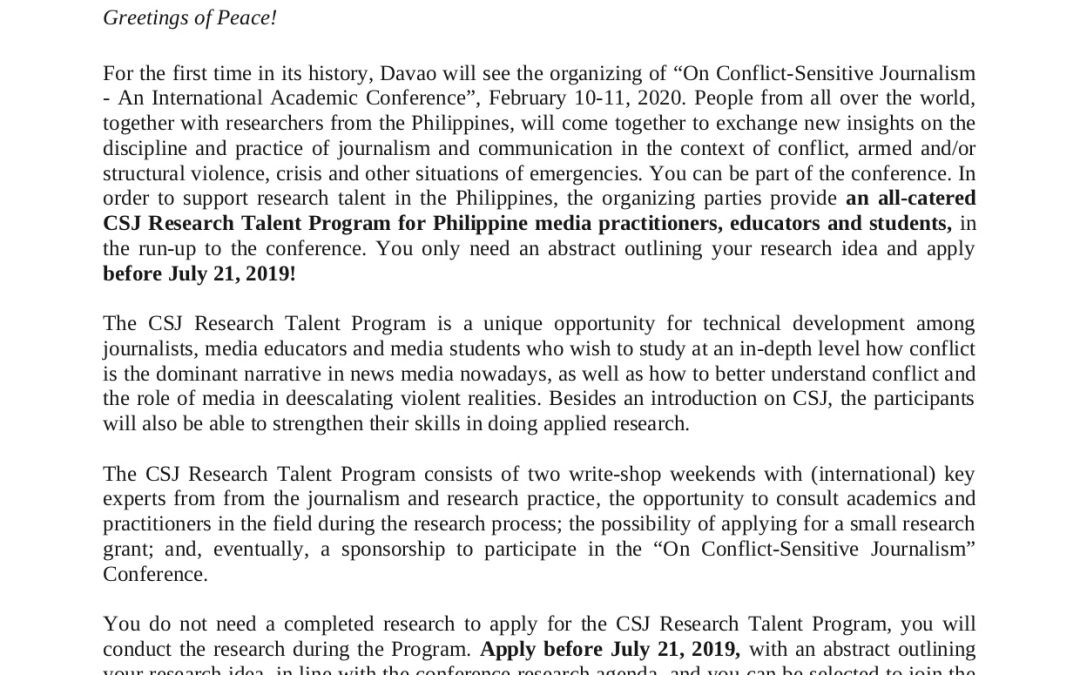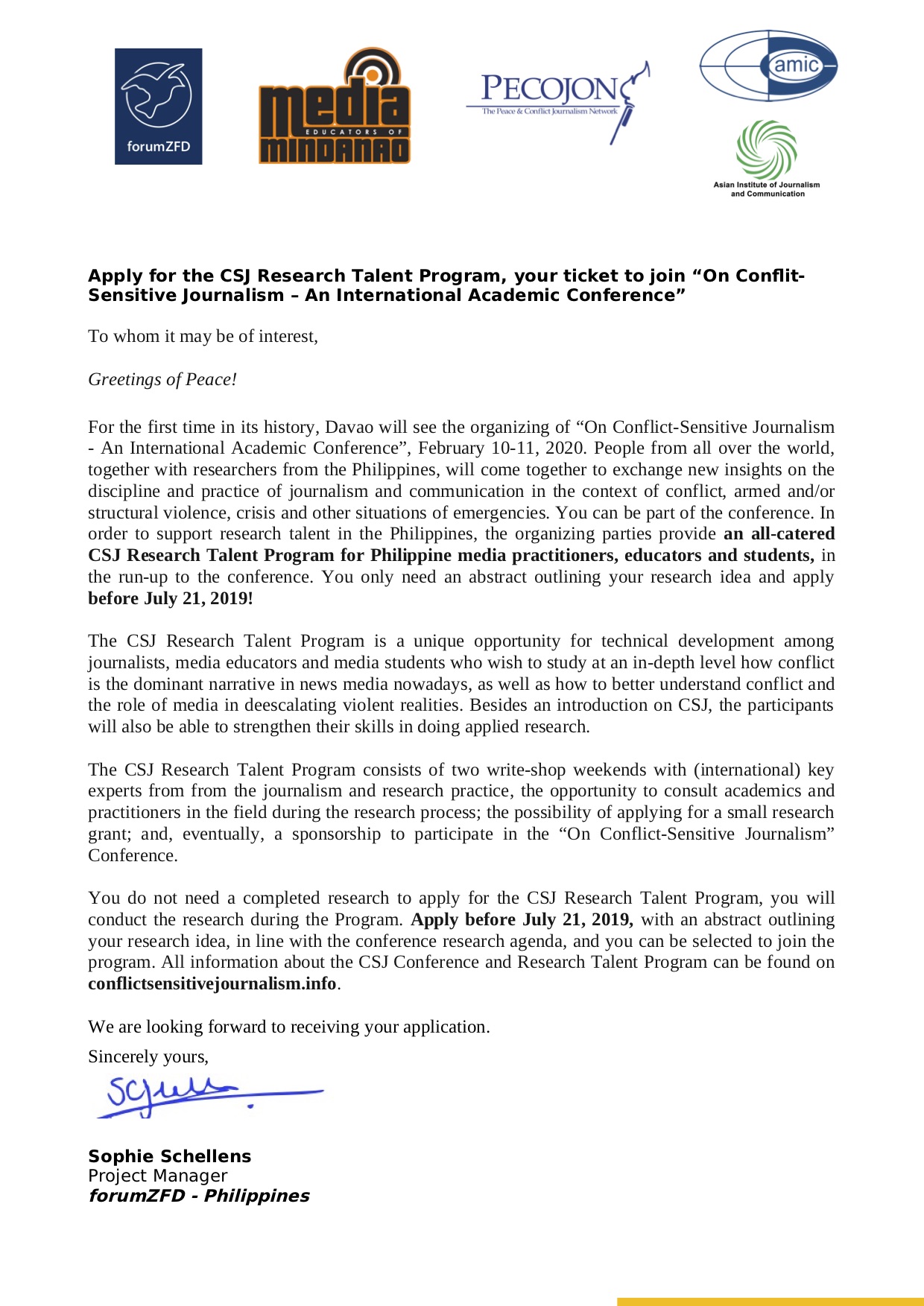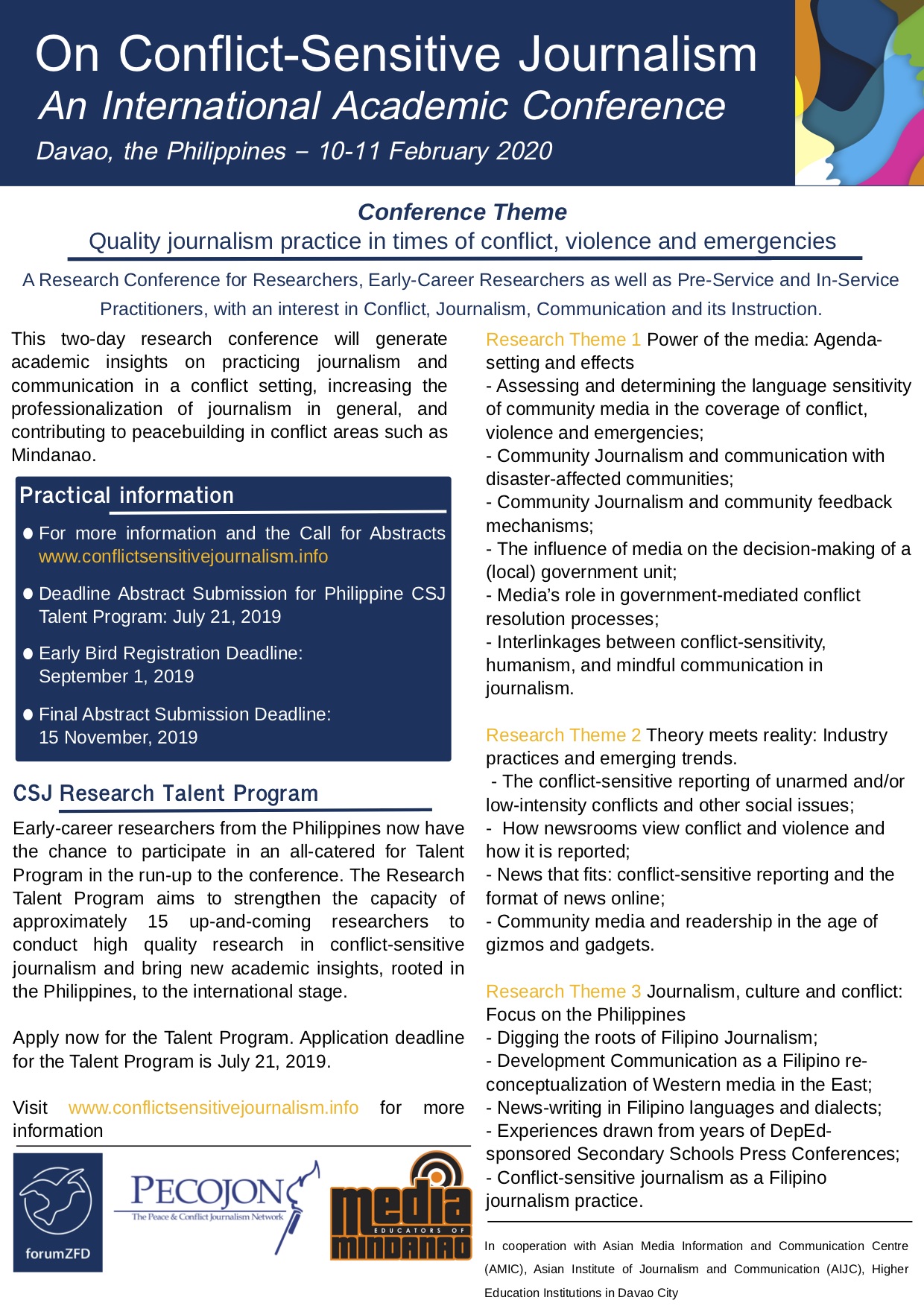
Knowledge Management Practitioner Certification Course
Announcement
The Asian Institute of Journalism and Communication (AIJC), the Asian Media Information and Communication Centre (AMIC) and the Community and Corporate Learning for Innovation( CCLFI) are inviting your members to register in the 17th class of the CCLFI online mentored Knowledge Management Practitioner Certification Course. The class will begin on February 17, 2020. The advantages of this course are:
- It does not disrupt your work or travel schedules because it does not require you to be online at specific dates and times. You devote a total of about three hours per week at different times that suit your schedule.
- Two experienced mentors with two decades each of knowledge management experiences will guide your learning processes, Dr. Serafin Talisayon and Dr. Daan Boom. Check their profiles here: http://www.cclfi.net/who-we-are
- You practice knowledge management in your workplace, thereby enhancing work performance and generating benefits for your organization.
- Graduates of previous classes from Asia, Europe, Africa, North, and South America had expressed satisfaction from the course. Read their reactions here: http://www.cclfi.net/products_services/kmpcc
Course Objectives
At the end of the course, participants are expected to be able to –
- Link knowledge management (KM) with organizational performance objectives, including enhancing productivity and innovation;
- Practice thirty (30) basic or unit knowledge management skills (see list on page 2) along six areas: establishing and managing workplace learning processes, managing intellectual capital, making KM assessments and measurements, enhancing organizational performance, managing the content of a website, and motivating knowledge workers ; and
- Select, adopt, practice and document a KM tool or solution appropriate to one’s workplace or business process problem.
Learning Processes and Outcomes
The course will feature the following approaches:
- Learning by doing under a mentor;
- Learning through interaction with other participants;
- KM concepts are introduced via participants’ experiences using actual examples, class polls, and exchange of experiences among participants;
- Learning is enhanced by conscious reflection of the participant’s own learning process;
- Learning in the context of, and relevant to, the participant’s workplace;
- Use of a practice website, and the participant’s own dedicated practice webpage, where all work outputs and class communications are archived and accessible for review at any time including after the course is over;
- Weekly learning sessions: each participant can log in several times during the week and at any time conveniently suited to his/her daily schedule (there is no need for participants to log in at the same time); the participant devotes a total of about three (3) hours per week.
- Progress of each participant is monitored through a participatory online monitoring form which is part of the practice website and is itself a KM tool;
- Use of metrics to demonstrate impact of KM on work performance; and
- Measurements of impacts of the course on the KM skills of each participant.
Ten (10) weekly KM Lessons
Principles and concepts in KM will be discussed over ten weekly learning sessions. Optional lessons will be available for participants who want to learn more:
- Definitions and KM framework Optional: KM for the public and development sectors
- Tacit and explicit knowledge Optional: What is more valuable?
- Aligning KM with organizational objectives Optional: KM logframe for development projects Optional: Measuring the social reach of a knowledge product/service
- Demand-driven KM Optional: Demand-driven KM: Whose demand?
- Selecting the right KM tool Optional: Knowledge translation: writing and delivering user-responsive knowledge products Optional: Quad bottom line
- Organizational learning Optional: Tools for cross-project learning Optional: Communities of Practice
- Innovation: organizational practices Optional: Social innovation
- Innovation: individual practices Optional: Personal stories of innovating new development tools
- Managing intellectual capital Optional: Community intellectual capital and other intangible assets
- KM assessments and action planning for KM practicum Optional: Success factors in KM implementation
Thirty (30) Basic KM Skills
In addition to KM theory, the following basic or unit KM skills will be learned through practice:
Content management of a website
1.1 Editing and updating a webpage
1.2 Creating a webpage with functionalities to suit its purpose
1.3 Managing a threaded online forum
1.4 Evaluating how demand/user-driven is a website
Managing intellectual capital
2.1 Setting up a web-based self-updated expertise directory
2.2 Identifying elements of my relationship capital
2.3 Aligning KM to organizational objectives
2.4 Innovating for “next practice”: what went wrong and why?
Establishing and managing learning processes in the workplace
3.1 Keeping a learning journal: My most significant learning
3.2 Making our thinking process visible: mind mapping
3.3 Setting up an “Ask Me” procedure
3.4 Conducting a lessons-learned session
Motivating knowledge workers
4.1 Making explicit the inner drives of a person: my passions
4.2 Explaining benefits of KM to a superior: contest with prizes
4.3 Identifying and designating in-house consultants
4.4 Creating a KM persona that suits a person’s talents and passions
Enhancing organizational performance
5.1 Identifying generator knowledge assets and critical knowledge assets 5.2 Estimating peso value of a demand-driven intranet
5.3 Collecting and organizing work templates
5.4 Setting up and managing an online participatory M&E
KM assessments and measurements
6.1 Assessing process efficiency and effectiveness 6.2 Identifying potential KM champions
6.3 Estimating the market value of my human capital 6.4 Selecting KM tools to match workplace needs
Innovation (knowledge creation)
7.1 Setting up an idea register
7.2 Mining customer complaints
7.3 Problem finding versus problem-solving
7.4 Questioning your assumptions
7.5 Two-phase creative brainstorming
7.6 Go outside your comfort zone
Features of the Course
- It is approved and endorsed by the People Management Association of the Philippines – the largest professional association among human resource development and personnel managers in the Philippines.
- The Course has almost 200 graduates from 30 countries since the course was introduced in 2013.
- The course is popular among development organizations. We have graduates from Horizont3000, UNICEF, UN Volunteers, Laos-Australia Learning Development Facility, World Wildlife Fund, International Centre for Integrated Mountain Development, Asia Foundation, ILO, Catholic Relief Services, FAO, African Development Bank, Sparkassenstiftung, Asian Development Bank, UN Habitat, Lux-Dev, World Vision and EMI Megacities.
- Designed by knowledge management specialists from CCLFI or the Community and Corporate Learning for Innovation – the most experienced company in knowledge management in the Philippines since 1999.
- Rated well by a sample of the graduates:
- 44% of a sample of graduates surveyed in April 2018 said that their workplace KM practicums were evidently useful or beneficial and hence were adopted or replicated by other staff or teams in the organization.
Course Fee and Discounts

Notes:
- Multiple discounts, if applicable to you, are allowed. If you are one of a group of 5 or more and you pay early to avail of the “early bird” discount, 15% and 10% are both applied in the following manner: P32,000 x .85 x.9 = P24,480.00.
- Bank remittance must be made within 30 days of course start date. Email a scan or photo of the bank receipt to serafintalisayon@gmail.com and babes.afable@gmail.com. Receipt of payment by CCLFI completes the registration process.
- The group discount does not apply if remittance is made beyond 30 days from course start date.
- If a sponsoring organization will pay the course fee after the course is over, a late payment surcharge of 20% is applicable.
- Installment payments are not accepted.
- Please see the Registration Procedure on how to remit the amount to CCLFI.



